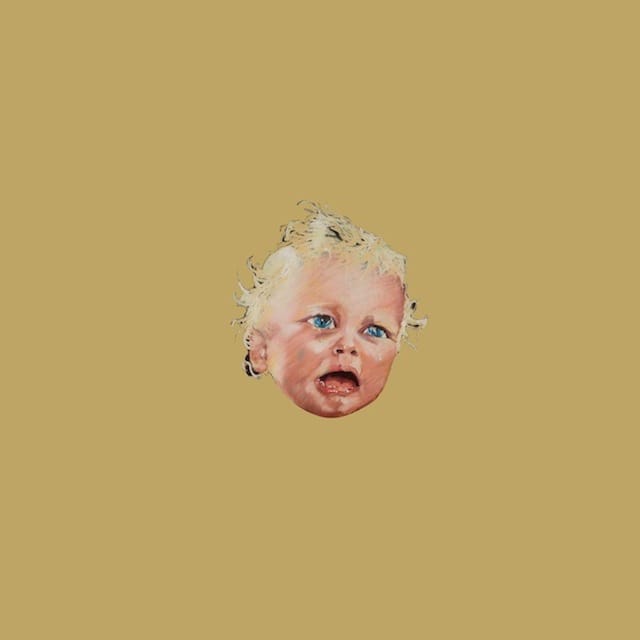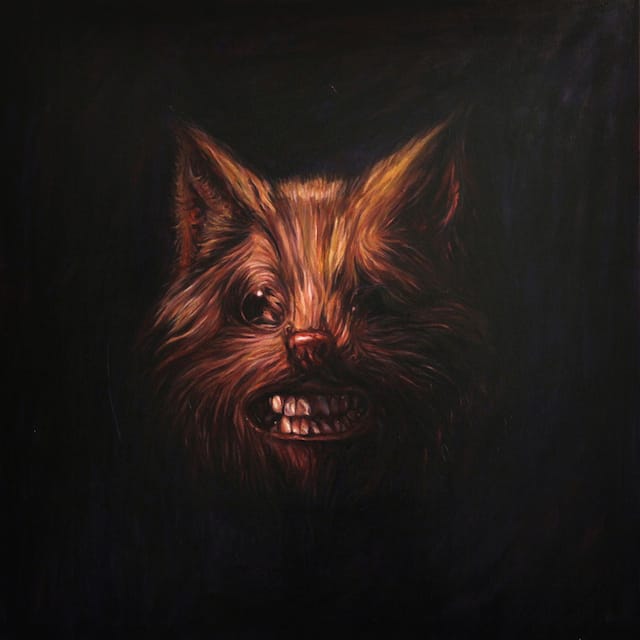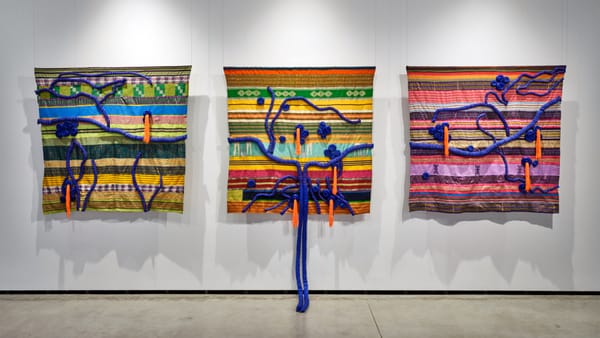Magnum Opus Cycnorum
Swans, led by one Michael Gira, are the only band around right now to combine the abrasive militancy of classic American noise rock with mind-boggling avant-garde imagination.

A man wakes up, lying in the forest, as the sun rises. He blinks once, twice, looks around, fully alert. He feels the morning upon him, warm sunrays on his back, pine needles under his legs. He wears a white button-down shirt, an old pair of black jeans, and a tan cowboy hat. His eyes are calm, his jaw firm. With a careful hand he touches his face: the traces of a mustache. Slowly he sits up, bows his head forward, closes his eyes, as if in pain. The man, Gira, has gone by many names to many people, and to all but himself he is a mystery, with shadow in his face and tension in his body. Were he to speak aloud, his voice would be rough like rusty metal, but he has not said anything to anyone for almost thirty years.
Swans, led by one Michael Gira, are the only band around right now to combine the abrasive militancy of classic American noise rock with mind-boggling avant-garde imagination. Although they were never more than a cult band in their heyday, their reunion records have been seized upon by rock critics everywhere as major, historic, epoch-defining statements, and even for skeptics their achievement is clear. Immersed in experimental, aleatory sound more suited to a contemporary classical audience, they bring an epic feel to their dissonant songs/fragments/compositions, and as such win over alternative rock connoisseurs who respond primarily to scale and ambition. They stretch out songs to last over half an hour, yet include enough sonic detail that there’s always something hypnotic to listen to. They blend weird acoustic instruments into their throbbing guitar channels, adding an ominous, eerie edge to their music that can compel and fascinate. They demand and earn your respect.
Crazed shaman Michael Gira and a rotating cast of equally fearsome New York sludge-rockers founded Swans in the mid-’80s alongside a spate of other loud, chaos-devoted ensembles. Famous for live shows during which the band would not only deafen everybody in the room with a violently unstoppable barrage of distortion but also physically attack people who got too close to the stage, they gradually built up a reputation for themselves as the most uncompromisingly aggressive band in the subculture. Diverse and bizarre, they generally aestheticize to an extreme degree the angry anomie of so many American indie bands — abusive and self-immolating where Black Flag, say, was only alienated. But the band wore out eventually, breaking up in 1996, whereupon Gira pursued his muse for a decade with the quieter, more pleasant Angels of Light project. So when all of a sudden he decided to resurrect Swans, releasing the brand new My Father Will Guide Me Up a Rope to the Sky in 2010, the band had become more beloved in retrospect than it ever was in the ’80s or ’90s, and all of a sudden the old misanthropes were full-fledged critical darlings. My Father Will Guide Me Up a Rope to the Sky garnered a fair amount of acclaim, and 2012’s The Seer and 2014’s To Be Kind are even more popular. Finally, the subculture has embraced them.

Both The Seer and To Be Kind are long, expansive double albums, each about two hours in length, and although The Seer is simultaneously emptier and more alluring, the two records signify a new direction for Gira. Aiming for vividly overwhelming emotional release, over a seemingly endless span of time he steadily and deliberately builds up giant hurricanes of cacophonous sound, leading to moments of total, grinding, bone-rattling catharsis. Shorter, more fragmentary attempts at songform help keep the pace, providing welcome relief from the exhausting, all-consuming rage of the longer pieces. Where seething noise still dominates, an array of violins, mandolins, dulcimers, bagpipes, and occasional horns creep into the mix as well, and the consequent acoustic elements soften and enrich the screeching electric teeth that the band sinks into the listener’s ear; this musical construction feels somehow organic, comforting, if no less harsh. Dissonant, atonal percussive devices complement textures and rhythms, hissing and whimpering and crashing through assorted instrumental layers, although the tempos rarely surpass a crawl, and Gira’s ragged voice and cosmic/existential lyrics add a crucial sense of calm technological mystagogy. To heighten the grand, momentous mood, he plays with religious and especially nature imagery, but the words disappear into the swirling storm of the band’s uproar, as do what few melodies he chooses to grace his compositions with. Quite often, in order to sustain a measured intensity, the band will repeat the same guitar figure ad infinitum, remaining on one constant chord for minutes at a time until the arrangement shifts to something else entirely. The resulting music is so massive that both albums feel like heroic, earth-shaking journeys, after which both band and listener have been forever transformed.
To Be Kind is definitely a stronger, more engaging album than its predecessor. Not only are its instrumental interludes tougher and chewier, but it lacks “Song for a Warrior,” the icky poetic ballad that revealed everything else on The Seer as pseudoreligious blather. Given the overwrought scale and solemn atmosphere, however, not much has changed. Gira can write a gut-churning riff when he wants to, like in the first section of “She Loves Us” and most of “Oxygen.” “A Little God In My Hands” works up a nice punk sneer, and “Just A Little Boy (For Chester Burnett)” builds magnificently, repeating the same tantric reverb pattern until it sways and shudders in the wind, creaking under Gira’s wild, panicky, wacked-out shrieks. At its best, this music lends rock fury to the kind of extensive, composed macrostructure that is the great virtue of classical if not contemporary classical music. For the most part, though, the band’s twenty-minute sagas never quite reach the primal ferocity they advertise, leaving white noise that often borders on unlistenable and just as often wanders aimlessly. So much chaotic avant-garde music, whether played on distorted guitars or shrill horns or the superfallible human voice, is raucous and above all ugly. More committed to classical standards of beauty than Gira would like you to think, To Be Kind never approaches that aesthetic mode. However much you admire the album in theory, it’s just too repetitive, too dreary, too slow, too metaphysical in its pretension, too symphonic in its grandeur, too arid in its atonality, too turgid in its flow. Unless you share Gira’s twentieth-century ideas about timbre, nineteenth-century ideas about climax, and pompous ideas about spirituality, there’s no way his music will ever hold your attention.
The man feels his temples with both hands: splitting headache. Thoughtfully, he looks up to the sky, past the trees, past the red sunrays filling the forest with a warm and delicate glow. He hears something, and tries to concentrate on what it is. He narrows his eyes, thinking hard; he clenches his fist, and focus eludes him. His unwavering calm suddenly vanishes, his forehead flares with sweat, he almost bites his tongue. He takes a deep breath, then another. Why can’t he place the faraway music in his head? Harsh and industrial, sacred and exotic — uncanny temptation calling him from miles away. He stares intently into space, and a grand, beautiful hunger for cacophony erupts in his mind. He knows what the music feels like, because it feels like eternity and the universe, and passion, and all the emotions he’s ever felt. But why can’t he pin down what it sounds like? He lays his head down and shuts his eyes tightly, examining his mind and longing for the music. By the time the sun has fully risen and all the birds have started chirping, he’s dozed off again.
To Be Kind and The Seer are available through amazon.com.





